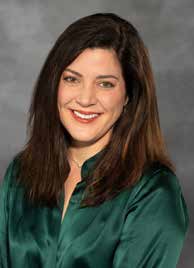Spring 2023
Groundbreaking virtual reality research to inform youths’ police perceptions
What can VR reveal about police interrogations?

Associate Professor H Hayley Cleary is exploring the slippery slope between permissible police interrogation techniques and coercion in police interrogations. Research shows that youths’ developmental immaturity makes them vulnerable and more likely to provide false confessions to escape police pressure or appease investigators. ThThe boundaries of this fifine line have yet to be fully defifined, and courts determine voluntariness on a case-by-case basis. “Virtual reality is uncharted territory for interrogation research and is poised to transform the way we study these interactions,” Cleary said. “VR enables us to simulate real-world interrogations while also retaining experimental control and ensuring participant safety — it’s the best of both worlds from a research perspective.” ThThe study, supported by a VCU Quest Fund, is aimed at informing both law and policy, particularly for individuals of color, who may experience heightened disadvantage in interrogations. Cleary’s aim is to help establish equitable legal processes and reform systems for all youth. Filmed in an actual Richmond Police Department interrogation room, the VR simulation places research participants in an immersive scenario in which a detective questions a young person using a variety of interrogation techniques. Sitting closely beside the questioned subject and across from detectives, the research participant witnesses the full interrogation. ThThe sensory VR immersion experience is called “embodiment,” a perceived substitution of a person’s physical identity with that of a virtual body. Embodiment creates a powerful sense of agency and participatory involvement throughout the process. Participants report their perceptions of custody and coercion during and after the VR experience. ThThe study also captures physiological biofeedback signals throughout the entire virtual experience. Combining the qualitative and quantitative data will give Cleary an unprecedented window into the minds of developing youth. Cleary fifirst conceptualized the scenario a few years ago, but she needed a partner to help implement the project on the technical side. Serendipitously, she learned about David Waltenbaugh, a VCU double alumnus (’06 B.S. and ’10 M.A.). Waltenbaugh is CEO of Root VR, a Richmond-based organization focused on developing virtual platforms to support adolescents’ mental health and therapy. After two years of planning, Waltenbaugh and Cleary combined the research and tech angles to bring the project to life. ThThey connected with Brian Dismore of Moon Day Productions and brought on two more VCU connections — Doug Blackburn, adjunct professor of theatre, and Joel DeVaughn, a theatre undergraduate student — to join the team as actors. “Virtual reality is primarily recognized as a means of next-generation entertainment and social engagement, but the technology’s incredible potential to change the future of science, education, health care, criminal justice and so many other areas of study remains largely unappreciated,” Waltenbaugh said. “It has the ability to change our understanding of the world and the way we experience it.”
"VR enables us to simulate real-world interrogations while also retaining experimental control and ensuring participant safety — it’s the best of both worlds from a research perspective."
-Hayley Cleary
Spring 2023 / In this issue
- Letter from the dean's office
- Boots on the ground: Chernoh Wurie
- “Triple Pandemic” book release
- VR and police interrogation
- Governor’s voice Q&A
- Bringing equity to emergency management and disaster
- Spotlighting evictions in Virginia
- Alumni spotlight: Myra Goodman Smith
- Verbatim: Bob Holsworth
- Faculty achievements
- Growing entrepreneurial equity
- Alumni spotlight: Joshua Son
- Why I give: Eva S. Teig Hardy